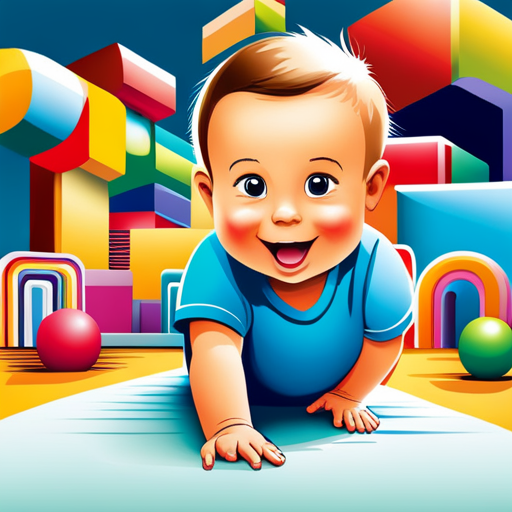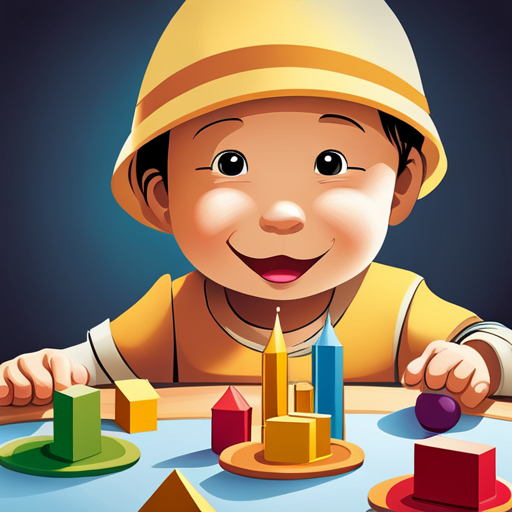"Cherishing Little Steps - A Haven for Baby and Family Journeys"
Baby’s Milestones Guide
Welcome to Baby’s Milestones Guide, your trusted companion on the exciting journey of your little one’s growth and development.
Picture this: the soft gurgles, tiny hands reaching out, and those precious first steps. As a parent, you want to savor every moment and ensure your baby reaches their milestones with confidence. That’s where our guide comes in.
Packed with practical advice and expert tips, we’ll help you navigate the wonderful world of social and emotional development, cognitive and language skills, gross and fine motor skills, sleep patterns and routines, feeding milestones and nutrition, as well as sensory development and exploration.
Get ready to embark on this amazing adventure, knowing that you have the knowledge and support you need to nurture your baby’s every milestone.
Key Takeaways
- Milestones act as markers for a baby’s growth and progress.
- Monitoring milestones helps identify potential delays or issues early on.
- Attachment and bonding are crucial for emotional well-being.
- Establishing consistent sleep patterns and routines is important for babies.
The Importance of Milestones

You should understand the importance of milestones in your baby’s development. The significance of milestones lies in the fact that they act as markers for your baby’s growth and progress. These developmental milestones, such as rolling over, sitting up, and crawling, provide a clear indication that your little one is on track with their physical and cognitive abilities. By monitoring these milestones, you can ensure that your baby is developing as expected and identify any potential delays or issues early on.
The benefits of milestones are twofold. Firstly, they give you peace of mind as a parent, reassuring you that your baby is reaching the appropriate milestones at the right time. This knowledge provides a sense of validation and reassurance that your baby’s development is on track. Secondly, milestones allow healthcare professionals to assess your baby’s growth and development accurately. They serve as a helpful tool for pediatricians to monitor your baby’s progress during routine check-ups and identify any areas that may require further attention or intervention.
Understanding the significance and benefits of milestones empowers you to support your baby’s development actively. By celebrating these achievements and offering appropriate stimulation and encouragement, you can foster a nurturing environment that promotes your baby’s continued growth and progress.
Social and Emotional Development

As your baby grows, they will be developing their social and emotional skills through interactions with others. This stage of their development is crucial for building healthy relationships and understanding their own emotions. Two key aspects of social and emotional development are attachment and bonding, and self-regulation and emotional control.
Attachment and bonding are essential for your baby’s emotional well-being. They begin to form attachments with their primary caregivers, usually their parents, in the early months of life. This bond provides them with a sense of security and trust, allowing them to explore the world around them with confidence.
Self-regulation and emotional control are skills that your baby will gradually develop over time. As they grow, they learn to manage their emotions and reactions in various situations. It is important to provide a supportive environment for them to learn these skills, as it will help them navigate through challenging experiences later in life.
To better understand the milestones associated with social and emotional development, here is a table summarizing the key aspects and approximate ages at which they typically occur:
| Milestone | Age Range |
|---|---|
| Forming attachments | 0-6 months |
| Recognizing emotions | 6-12 months |
| Displaying empathy | 12-24 months |
Cognitive and Language Skills

Your baby’s cognitive and language skills will begin to develop as they explore and interact with their environment. It’s an exciting time as you witness their progress and growth. Here are some key milestones to look out for:
-
Cognitive Development:
- Your baby’s brain is like a sponge, absorbing everything around them.
- They’ll start to recognize familiar faces and objects, showing signs of memory development.
- They may also begin to understand cause and effect, such as realizing that pushing a button makes a toy light up or play music.
- Encourage their curiosity by providing age-appropriate toys and activities that stimulate their senses.
-
Language Acquisition:
- Your baby will start to babble and make different sounds as they experiment with their vocal cords.
- They’ll also begin to imitate sounds and gestures they see.
- Around 6 to 12 months, they may say their first words like ‘mama’ or ‘dada.’
- Read to your baby and engage in conversations, even if they can’t respond yet.
- This will help build their language skills and vocabulary.
-
Understanding Simple Instructions:
- As your baby’s language skills develop, they’ll start to understand simple instructions like ‘wave bye-bye’ or ‘give me a hug.’
- This shows their growing ability to comprehend and follow basic commands.
- Keep communication clear and simple, using gestures and facial expressions to enhance understanding.
-
Problem-Solving:
- Your baby’s cognitive development also includes problem-solving skills.
- They may start to figure out how to stack blocks or fit shapes into corresponding holes.
- Encourage their problem-solving abilities by providing toys that challenge them, such as puzzles or shape-sorters.
Gross and Fine Motor Skills

Babies typically begin developing their gross and fine motor skills during this stage of their development. Gross motor skills involve the use of large muscle groups and help your baby gain control over their body movements. This includes actions like rolling over, crawling, standing, and eventually walking. Encouraging tummy time and providing safe spaces for your baby to explore can help strengthen their muscles and improve their coordination.
Fine motor skills, on the other hand, involve the use of smaller muscle groups and are crucial for tasks that require dexterity and precision. These skills include grasping objects, picking up small items, and eventually using utensils. You can support the development of fine motor skills by providing toys that encourage reaching and grabbing, as well as offering opportunities for your baby to practice holding and manipulating objects.
It’s important to remember that every baby develops at their own pace, so don’t be alarmed if your little one takes a little longer to reach certain milestones. Be patient and provide plenty of opportunities for your baby to practice and explore their motor skills. Celebrate their progress and offer gentle guidance when needed. Remember, each step they take towards mastering their gross and fine motor skills is an exciting milestone in their development.
Sleep Patterns and Routines

Developing healthy sleep patterns and establishing consistent routines is essential for your baby’s overall well-being and growth. As a parent, you play a crucial role in helping your baby establish a healthy sleep routine. Here are some tips to guide you:
-
Stick to a consistent bedtime: Establish a regular bedtime that suits your baby’s natural sleep patterns. This will help them feel secure and develop a sense of routine.
-
Create a soothing bedtime routine: A calming routine before sleep can signal to your baby that it’s time to wind down. Activities like a warm bath, gentle massage, or reading a book can help relax your baby.
-
Be responsive to sleep regressions: Sleep regressions are common during your baby’s first year and can disrupt their sleep patterns. Instead of getting frustrated, be patient and provide comfort to help them through this phase.
-
Encourage self-soothing: As your baby grows, it’s important to teach them how to self-soothe and fall asleep independently. Gradually introduce soothing techniques like a lovey or a pacifier to help them develop this skill.
Feeding Milestones and Nutrition

To ensure your baby receives proper nourishment and reaches important feeding milestones, it’s crucial to understand the importance of nutrition. Feeding your baby isn’t just about providing sustenance; it’s an opportunity to bond and support their growth and development.
As your baby grows, their nutritional needs change, and it becomes necessary to introduce new feeding techniques and eventually, solids.
In the early months, breastfeeding or formula feeding is the primary source of nutrition for your baby. Breast milk or formula provides all the essential nutrients your baby needs for healthy growth.
As your baby reaches around 4-6 months of age, you can start introducing solids. Begin with single-grain cereals, mashed fruits, or vegetables, and gradually increase the variety and texture of the foods. This helps your baby develop their taste preferences and learn how to chew and swallow different textures.
It is important to remember that every baby is different, and they may have their own pace when it comes to feeding milestones. Some babies may take to solids quickly, while others may need more time. Be patient and offer a variety of healthy foods, allowing your baby to explore and develop their taste buds at their own pace.
Remember to consult with your pediatrician or a registered dietitian for guidance on feeding techniques and introducing solids. They can provide personalized advice based on your baby’s individual needs.
Sensory Development and Exploration

Engage your baby’s senses through exploration and play. Sensory exploration is an important aspect of your baby’s development, as it helps them understand the world around them and stimulates their brain. By providing opportunities for sensory experiences, you can help your baby develop their senses and enhance their overall development.
Here are four ways you can promote sensory exploration and development in your baby:
-
Tummy time: Place your baby on their tummy on a soft, safe surface and let them explore their surroundings. This helps them develop their sense of touch and strengthens their muscles.
-
Sensory toys: Provide your baby with toys that stimulate their senses, such as textured toys, rattles, and objects with different sounds. These toys encourage your baby to explore different textures, sounds, and colors, promoting their sensory development.
-
Nature walks: Take your baby for walks in nature and let them experience different sights, sounds, and smells. This helps them develop their visual and auditory senses and exposes them to new sensory experiences.
-
Messy play: Allow your baby to explore different textures and materials through messy play, such as playing with sand, water, or finger paints. This helps them develop their sense of touch and encourages their curiosity and exploration.
Tips for Encouraging Milestone Achievement

To support your baby’s milestone achievement, it’s important to provide them with a nurturing and stimulating environment. Here are some tips to help you encourage their independence and facilitate their developmental progress.
Firstly, give your baby plenty of opportunities to explore and play. Provide age-appropriate toys that stimulate their senses and promote interaction. Look for toys that encourage grasping, reaching, and problem-solving, such as rattles, soft blocks, and activity gyms. These toys won’t only entertain your baby but also help them develop important motor skills.
Secondly, create a safe and secure space for your baby to explore. Baby-proof your home by covering electrical outlets, securing furniture, and removing any small objects that could be choking hazards. This will allow your baby to freely move and explore their surroundings, which is crucial for their physical and cognitive development.
Lastly, encourage independence by giving your baby some freedom to explore and learn on their own. Resist the urge to constantly intervene or solve problems for them. Instead, provide support and encouragement as they attempt new tasks and reach milestones. This will help build their confidence and foster a sense of autonomy.
Frequently Asked Questions
How Can I Track My Baby’s Milestones and Development?
You can track your baby’s milestones and monitor their development by observing their progress in key areas such as motor skills, communication, and social interactions. It’s important to document and celebrate each milestone they achieve.
What Are Some Common Signs That My Baby Is Reaching Their Milestones on Time?
You can tell your baby is reaching their milestones on time when they show early signs of development and engage in activities like tummy time. Early intervention is important for their growth and development.
Are There Any Red Flags or Warning Signs That My Baby May Be Experiencing a Delay in Their Development?
If your baby is experiencing a delay in their development, there are warning signs you should look out for. Early intervention is crucial, so don’t hesitate to reach out to your pediatrician if you have concerns.
How Can I Support My Baby’s Overall Development and Help Them Reach Their Milestones?
You can support your baby’s overall development and help them reach their milestones by providing a nurturing and stimulating environment. Engage in activities that encourage their growth and celebrate their achievements along the way.
Are There Any Resources or Additional Support Available for Parents Who Have Concerns About Their Baby’s Development?
If you have concerns about your baby’s development, there are additional resources and early intervention programs available to support you. These can provide guidance, assessments, and therapies to help your baby reach their milestones.
Conclusion
Congratulations! You’ve reached the end of our baby’s milestones guide, and now you have the tools to support your little one’s growth and development.
Remember, every baby is unique and will reach milestones at their own pace. So be patient and celebrate each achievement along the way.
Keep nurturing their social and emotional skills, cognitive and language abilities, and motor skills.
With your love and guidance, your baby will continue to thrive.



Saved as a favorite, I love your blog!
My web page … vpn special coupon code 2024
Keep on working, great job!
Feel free to surf to my homepage :: vpn special
Thanks for the good writeup. It actually was a
entertainment account it. Glance complex facebook vs eharmony to find love online more
brought agreeable from you! By the way, how could we communicate?
Appreciate this post. Will try it out.
Look into my homepage eharmony special coupon code 2024
I always emailed this weblog post page to all my contacts, since
if like to read it after that my links will too.
My homepage nordvpn special coupon code 2024